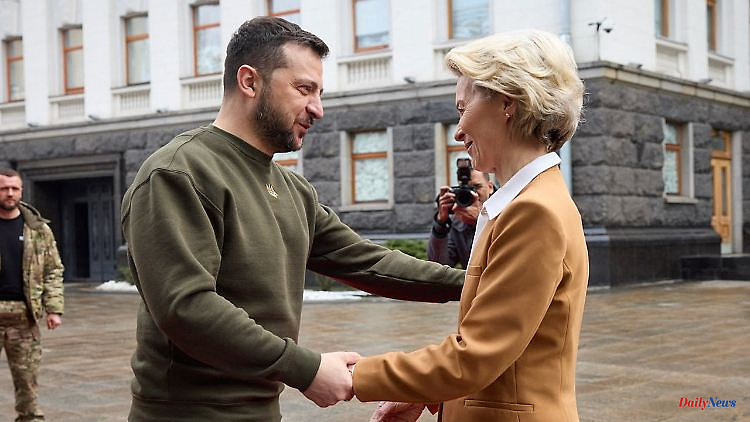Ursula von der Leyen travels to Ukraine with 15 commission members - and assures Kyiv of further support. The EU wants to impose a tenth package of sanctions against Russia and promises a significant expansion of the training mission.
EU Commission President Ursula von der Leyen pledged her support during her visit to Kyiv. She also officially announced new sanctions against Russia. "Between now and February 24, exactly one year after the start of the invasion, we want to complete a tenth package of sanctions," von der Leyen said at a joint press conference with Ukrainian President Volodymyr Zelenskyy.
The sanctions imposed so far have already caused considerable damage to the Russian economy, stressed the President of the Commission. The price cap for Russian oil alone costs Moscow "about 160 million euros a day".
The new sanctions package, which has been in preparation since December, is expected to include new entry and asset freezes for those responsible in Russia and its ally Belarus. A price cap for Russian petroleum products such as diesel or kerosene is also to come into force on Sunday, and representatives of the EU states are still discussing the amount. All sanctions require a unanimous decision by the 27 EU countries.
Von der Leyen arrived in Kyiv in the morning. She will be accompanied on her visit by 15 other commissioners, including foreign policy chief Josep Borrell. He officially promised Ukraine an expansion of the European Training Mission (EUMAM) for Ukrainian armed forces. EUMAM will train an additional 15,000 Ukrainian soldiers, bringing the total to 30,000, the Spaniard said after talks with Ukrainian Prime Minister Denys Schmyhal in Kyiv. He also announced that the EU would provide 25 million euros for demining in recaptured areas.
According to Borrell, the EU mission will also take care of the training of battle tank crews in the future. This is to ensure that the Ukrainians can effectively use the Leopard 2 tanks that countries like Germany and Poland want to provide.
The start of the EU training mission was decided in November by the foreign ministers of the member states. At that time it was said that up to 15,000 Ukrainian soldiers should first be trained in Germany, Poland and other EU countries. With the mission, the EU wants to help ensure that Ukrainian troops can defend themselves better than before against attackers from Russia. EU officials had already announced the planned expansion in Brussels on Wednesday.
As part of the EU mission, the Bundeswehr offers, among other things, combat training for companies and tactical exercises for a brigade staff and the subordinate battalion staffs. Around 70 Ukrainian soldiers are currently in Germany for training on the Patriot anti-aircraft missile system.
The two-day talks between the EU Commission and the Ukrainian government in Kyiv also deal with legal options for punishing Russia's war of aggression and the Ukrainian desire to join the EU as quickly as possible. The highlight of the trip is to be an EU-Ukraine summit on Friday. EU Council President Charles Michel is also expected to attend, but not the heads of state and government of the 27 member states.
"We are here together to show that the EU is as committed to Ukraine as ever," von der Leyen wrote on Twitter. A photo showed her after arriving on the night train. Der Leyen's trip to Ukraine is her fourth since Russia invaded the country in February last year. However, it is the first time that the former German defense minister will be accompanied by several commissioners.
In addition to von der Leyen and Borrell, the Vice-Presidents Margrethe Vestager, Valdis Dombrovskis, Vera Jourova and Margaritis Schinas are part of the EU delegation in Kyiv. For emergencies in Brussels has remained alongside other Vice President Frans Timmermans. He is number two in the EU Commission and would take over her duties on an interim basis if President von der Leyen were to fail, for example as a result of a Russian attack on Kyiv.
The Ukrainian President Zelenskyy recently said in a video speech that he expects decisions from the EU partners that correspond to the obvious progress made with reforms. He was referring to the fact that the EU admitted Ukraine to the list of candidate countries last June, but made the start of negotiations on accession conditional on the fulfillment of seven conditions. These are about the selection process for Ukrainian constitutional judges and a stronger fight against corruption - especially at a high level.
The EU is also demanding that standards in the fight against money laundering be observed and a law against the excessive influence of oligarchs be implemented. The EU Commission recently said that Ukraine had made progress, but that an official recommendation for the start of accession negotiations would probably not be made until the second half of the year at the earliest. "We have registered reform momentum, but there is still work to be done," said a senior official in Brussels on Tuesday.
The talks in Kyiv will therefore also deal with further necessary progress, for example in the fight against corruption and possible EU support. Further topics will be the dismantling of trade barriers, humanitarian and military aid and the planned admission of Ukraine to the EU roaming area. The latter would mean that Ukrainians could use their mobile devices to make calls, text messages and use data services within the EU without having to fear additional costs. Likewise, this would apply to EU citizens in Ukraine.












